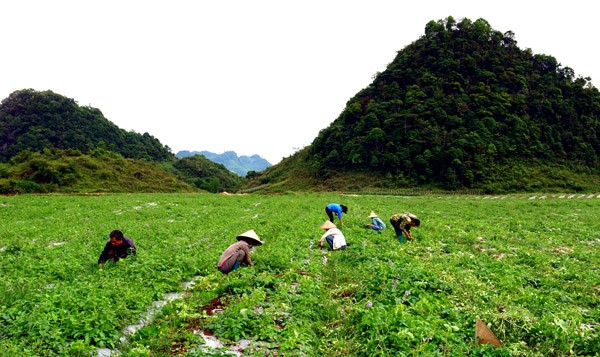(VOVWORLD) - As a gateway district leading to Dong Van Karst Plateau Geopark in Ha Giang province, Quan Ba is home to many natural medicinal herbs thanks to its cool climate. It is also suitable for growing and developing herbal trees imported from other localities or countries. Realizing their economic value, Quan Ba has preserved and expanded the cultivation areas of the trees, helping to raise the income for local ethnic groups.
 Medicinal herb plantation in Quan Ba district. (Photo: baohagiang.vn) Medicinal herb plantation in Quan Ba district. (Photo: baohagiang.vn) |
Quan Ba authorities have attracted investment from locals and enterprises in the plantation and processing industry, as a way to accomplish its plan to develop medicinal herb cultivation.
To date, the district has a total of 3,000 hectares of medicinal herbs. Vang Sin Chu’s family in Quyet Tien commune is cultivating medicinal herbs on 15 ha of land.
“Over the past 2 years, growing medicinal herbs has brought in higher productivity and income over planting rice and corn, each year earning 4,400 USD. Nurturing the young saplings and removing weeds take the most time and effort,” said Chu.
A number of local households have proactively looked for consumption markets and are sharing their experience in plantation and production of medicinal herbs with each other.
Luc Dung Truong of Quyet Tien commune has repurposed 1 ha of the garden into land for planting Red Ginseng trees. Apart from joining training courses held by the district, Truong has travelled to other localities to learn from their cultivation and reproduction experience.
“Starting this year, we have begun to grow medicinal herbs. It’s quite easy to care for the plants because they have few pests. If we register the plantation with the local authorities, we receive financial assistance of 220 USD to buy fertilizer. If this crop is successful, we will expand the cultivation area,” Truong said.
The Quyet Tien administration has conducted vocational training and farming technique transfer programs to help local farmers take better care of and conserve indigenous medicinal herbs, in addition to supporting interest rates or part of the production costs incurred in purchasing fertilizer and saplings.
Le Trung Kien, Chairman of Quyet Tien commune People’s Committee, told VOV: “Quyet Tien has been selected as a central hub for the cultivation of medicinal herbs. We have conducted regular communications activities on state support policies, and created favorable conditions for enterprises to work with local farmers. Currently, 2 businesses and 3 cooperatives have jointly grown medicinal herbs with local farmers. More than 300 hectares of land in the commune have been earmarked for medicinal herb cultivation.”
Hang Duong Thanh, Deputy Chairman of Quan Ba district People’s Committee, said the local government has promulgated a mechanism for attracting investment in sapling production towards setting up a system of qualified breeding and the conservation of local herbal gene pools.
“Herb farming is very important for Quan Ba’s agricultural development and poverty reduction. In the future, we will work to further develop local and imported medicinal herbs, some of which have been successfully grown as part of a pilot program in the locality. During the production process, we have closely linked farmers, entrepreneurs, scientists and consultants with state agencies, acting as a liaison. The production focuses on value chains,” said Thanh.
The cultivation of medicinal herbs in Quan Ba district has seen initial results in social and economic efficiency, partly turning Ha Giang into a national hub for medicinal herb supplies for domestic and international markets.